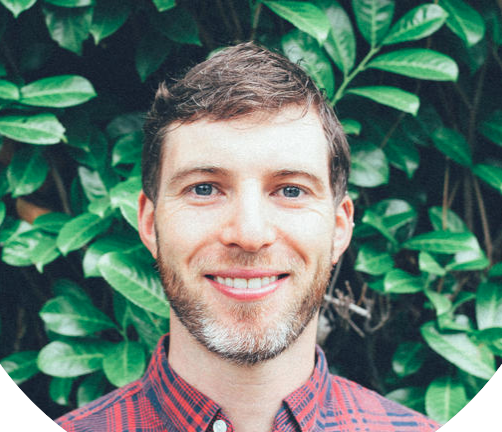Last fall, Jax Richards ducked into a coffee shop near the Oregon State University campus in Corvallis to talk about criminal justice reform at a discussion hosted by a student organization. Richards is a junior majoring in economics and public policy, so he is no stranger to discussing hot-button political issues. He considers himself politically liberal on almost every issue though he emphasizes that he doesn’t “walk the party line.” He’s been called a “baby killer” by conservatives for believing in a woman’s right to an abortion and “incompetent” and “stupid” by those to his left for not supporting Medicare for All. A lifelong Boy Scout, he was labeled a “fascist” by some for attending the national jamboree in 2017 where President Trump spoke.
With criminal justice reform, however, the issue is personal. Richards survived childhood abuse at the hands of his father, who is now a convicted felon. When he sat down with eight other students at the discussion, hosted by the OSU chapter of a national student group called BridgeUSA, he had a hardline view of how the U.S. should treat people convicted of crimes.
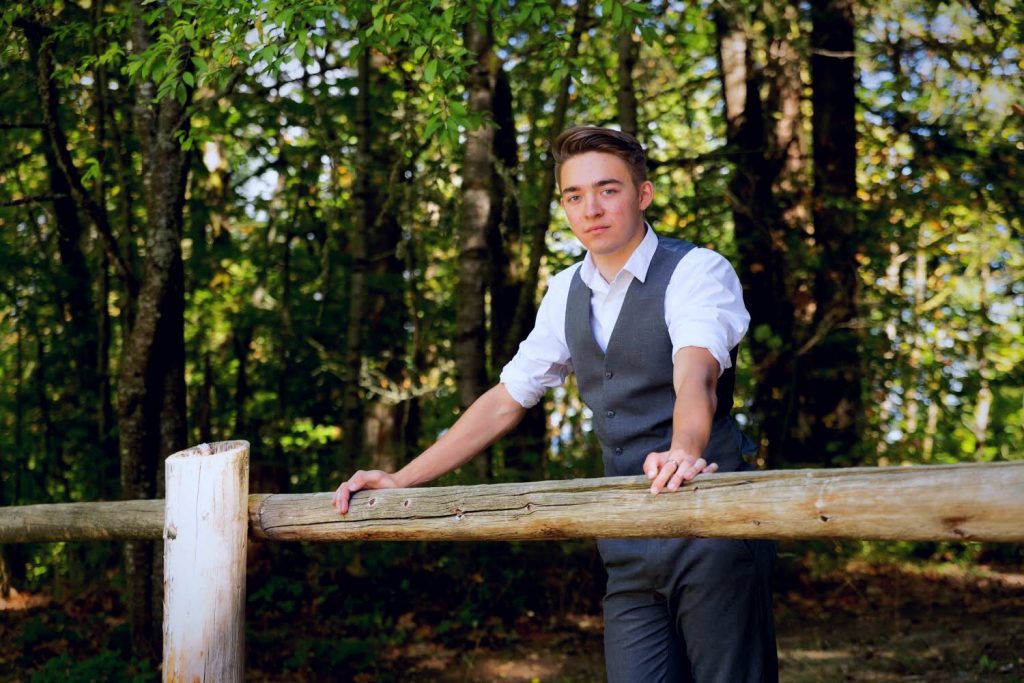
“We should throw the book at them,” he told them. “I believed in the death penalty and that prison should not be a top priority when we start addressing social justice and social change.”
When students started making the case for a rehabilitation rather than punishment model for addressing criminal justice, the conversation could have easily gone off the rails, with Richards drawing on his backstory to shut down dissenting views. “I did what a lot of people do with an emotional issue,” he says. “I came right off the bat and said I think rehabilitating the prison system isn’t feasible and my personal experience was what I used as my evidence.”
But the conversation did not devolve into a shouting match. Rather than push back or retreat to their preconceived views, the other students were empathetic to Richards’ experience. They asked him questions to better understand his mindset. Some brought more empirical evidence to the conversation about the disproportionate incarceration rates of people of color and offered up alternative European criminal justice models that focus on reintegrating convicted criminals into society.
An hour and a half later, Richards had begun to soften his view. “That conversation with BridgeUSA opened up new possibilities and curiosities for me to learn more about alternatives to hardline punishment,” he says. “It also provided more objective opinions from my peers and was a supportive environment that understood why I would hold those views.”

While Richards didn’t walk away that fall day with his convictions changed, it sparked him to explore the issue more in depth in his classes, through his own research and in conversations with others. Several months later in the wake of George Floyd’s killing, he has come around to a different attitude. “At the end of the day, rehabilitating individuals is a lot more beneficial as opposed to putting them in a horrible system.”
BridgeUSA is a national campus-based organization working to promote civil discourse in an increasingly polarized era through facilitated small group discussions. As higher education institutions struggle to balance free speech policies, safe spaces and deplatforming, BridgeUSA is one of several groups working to foster intellectual tolerance on college campuses. For Richards, the experience captures the best of what the college experience can be for young people still working through their opinions and worldviews.
“Bridge isn’t even at the level of contentious political family dinners,” says Richards. “The closest comparison I can make to the conversations I’ve had at Bridge are the long midnight car rides I’ve had with some of my best friends — not debates, but conversations of mutual understanding.”
That spirit of friendly, empathetic curiosity was sorely lacking at the University of California, Berkeley on February 1, 2017. That evening, right-wing provocateur Milo Yiannopoulos was scheduled to give a speech amid a climate of rising ultra-conservative and white nationalist views just weeks after Donald Trump was inaugurated as U.S. president. Student protesters attempted to block the event nonviolently. They were eventually joined by self-identified anti-fascists who turned the protest into a riot by launching fireworks at police, then smashing store windows on campus and in downtown Berkeley. University police put the campus on lockdown and canceled the speech.
BridgeUSA co-founder Manu Meel was a freshman at the time. He was leaving math class when he found himself caught in the melee. He later ended up in a campus building watching CNN, which was broadcasting a live feed of his own college going up in flames.
“I was shocked at the state of democratic engagement and what this means for higher education and learning,” he says.
In the aftermath of the February riot and subsequent campus unrest over controversial conservative pundits like Ben Shapiro and Ann Coulter, who were met with a sometimes violent response from far-left demonstrators, the university appointed a free speech commission to examine the recent events. The commission grappled with UC Berkeley’s legacy as the bastion of the Free Speech Movement in the 1960s, when students protested for the right to discuss political issues like the Vietnam War on campus. In 2017, the Berkeley College Republicans and invited speakers, who ranged from political commentators to fringe alt-right activists, argued that they also had a right to free speech for their views.
Crushed by negative news?
Sign up for the Reasons to be Cheerful newsletter.
Meel volunteered on a student council advising the commission, which concluded that students are either apathetic about politics or, if they are engaged, they take radically polarized approaches like right-wing trolling or anti-fascist property damage because violence and destructive engagement is the only model of discourse.
“The only dominant narratives are the extremes,” says Meel. “Not extremes in political ideology but extremes in terms of temperament. The norm is crazy discourse.”
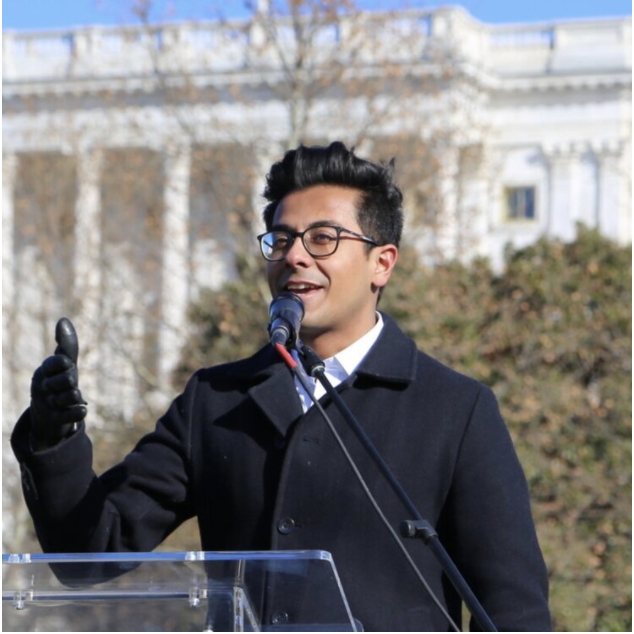
That conclusion inspired Meel to engage with what he saw as a silent majority — those who were neither rioting in black bloc nor reveling in right-wing provocateurs — in the hopes of fostering an alternative mode of political discourse. Soon after the Milo riots, students at Notre Dame, which had started a non-partisan political discussion group called BridgeND, reached out to their Berkeley counterparts. In the heat of the moment, the concept took off at Berkeley. Over 100 people showed up at the first BridgeBerkeley conversation in mid-February to debrief from the Milo riots.
From Berkeley, the Bridge concept spread to 24 campuses. Meel graduated in June 2020 and BridgeUSA has since become a non-profit start-up with Meel its first CEO, working out of a San Francisco apartment with a handful of Berkeley alumni.
“Our theory of change is that you have to show young people what it means to engage with democracy,” he says. “We elevate young people who believe in empathy, respect and engaged dialogue as a prerequisite to action.”
While BridgeUSA chapters occasionally host speakers — provided they have a history of constructive engagement — the organization generally eschews lectures. “Talks are a one-way mode of engagement. The core principle of Bridge isn’t about presenting your views, it’s about listening and engaging,” says Meel.
Instead, Bridge favors small group discussions like the one Jax Richards found his way to at Oregon State, where Bridge-trained moderators facilitate the discussion parliamentary-style, so that speakers address the moderator rather than someone else in the room with whom they disagree.
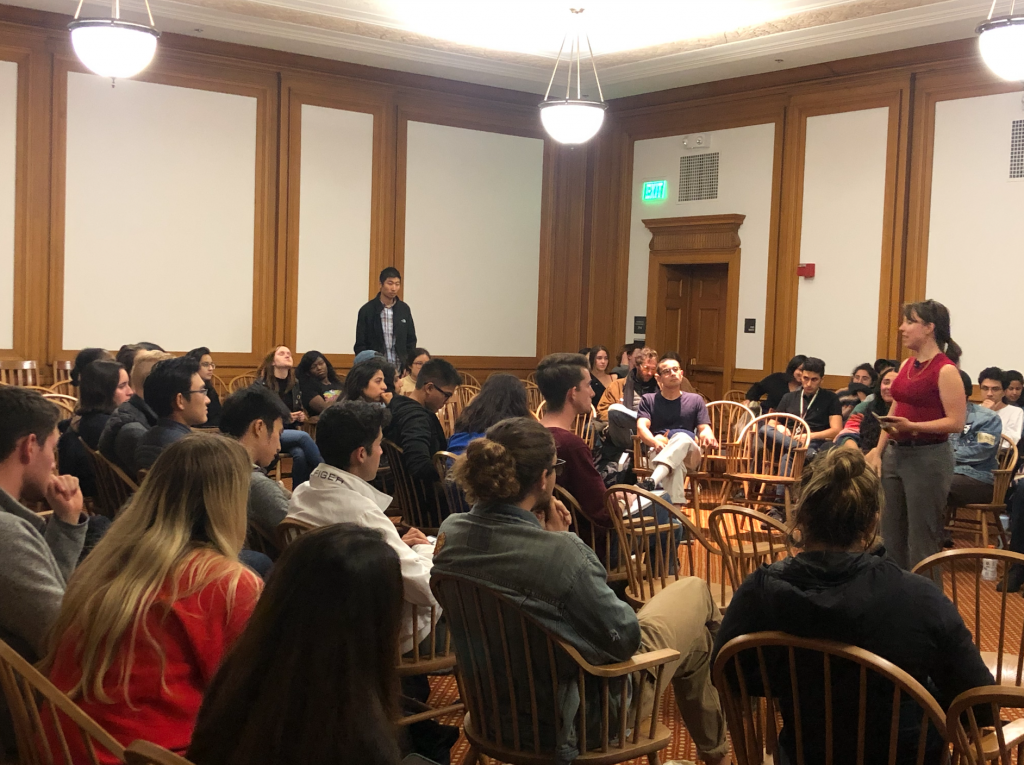
Not that there aren’t moments of tension. Meel recalls an immigration discussion with thirty-odd students in attendance where a DACA recipient, or “Dreamer,” made her case for why she believes Dreamers have a right to stay on campus. At the time, Trump was pushing Congress to cancel the DACA program and the university administration reacted by providing financial and legal support to undocumented students. A white student from El Paso, Texas stood up to rebut her argument. He put on a red “Make America Great Again” hat before stating his views that allowing so-called “illegal immigration” is a bad precedent that risks crime and violence, making him scared for his family.
Rather than the Dreamer backing away and leaving, or shouting in response to his argument, she responded to his values by expressing her fear of deportation and likening it to his fear of crime. After their back-and-forth, the moderator asked if anyone else had something to add. The other students, who had quietly let the two debate, didn’t talk about immigration. They latched on to the level of understanding that the two students, who couldn’t otherwise be more different, had reached.
“While they had totally different policy positions, they shared the same notion of safety, security and stability,” says Meel. “The process of empathy is to get at the level of values, and at the level of values you can break down arguments and find common purposes.”
Observing the process was at least as important as actually discussing the issue at hand. “A lot of kids have never spoken with anyone they disagree with politically,” says Meel. “The chapter builds the clout for them to do that.”

Moderation is also the key to success at Linn-Benton Community College in Albany, Oregon, which serves a politically mixed student body of more conservative Linn County and more liberal Benton County. Communications professor Mark Urista advises the student-led Civil Discourse Club, which arose in 2017 following controversy over sexually explicit artwork displayed on campus.
“What stood out to me right away was a clear divide between those who were enthusiastically supportive and those who thought it was completely inappropriate,” says Urista. “They were talking in their own echo chambers but not with each other.”
Promoting a collegewide discussion is difficult for a commuter campus, as many community colleges are. One experiment the club has tried is a public whiteboard that asks controversial questions like “Should vaping be banned on campus?” so respondents can weigh in at different times of day. While comments can be made anonymously, moderators from the club erase personal or partisan attacks.
“We have an etiquette sign,” says Urista. “This is not a free expression whiteboard — we are trying to teach people how to do civil discourse.”
Survey data and scholarly research on the political views of higher education instructors suggest that creating intentional spaces for students to share contrary views is necessary. In a 2019 survey on campus expression by Heterodox Academy, a non-profit advocating for viewpoint diversity on college campuses, 55 percent of students reported that the on-campus climate prevents them from saying something they believe, with one in three students reluctant to share political views in the classroom. Republican students were more reluctant than Democrats or Independents to talk about controversial topics like race, sexuality and gender, although not religion.
That sensibility is backed up by the ideological tilt of professors. In a 2018 paper, Mitchell Langbert, a business professor at Brooklyn College, analyzed the political affiliations of 8,688 professors at 51 liberal arts colleges. He found the Democrat-to-Republican ratio at an overwhelming 12.7 to one. In several colleges’ humanities and social sciences departments, he found consistently there were zero registered Republicans.
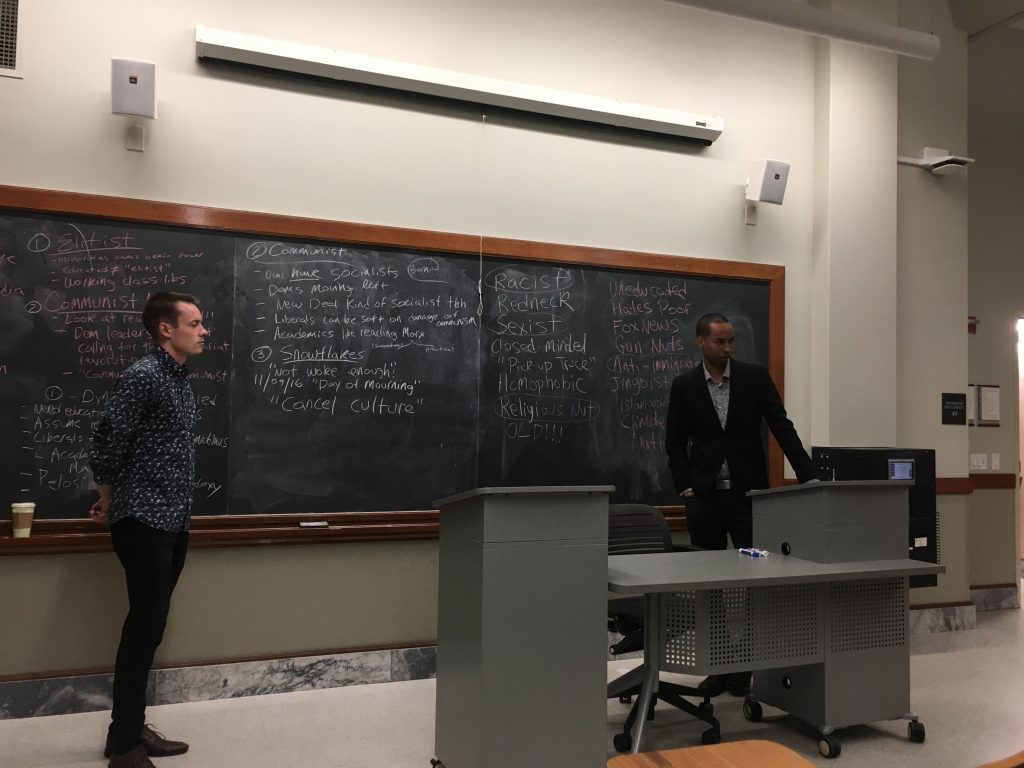
Debra Mashek, a tenured psychology professor at Harvey Mudd College who is now Heterodox Academy’s executive director, identifies as very liberal. She knows the problem all too well. “One of our founders spoke at a psychology conference where I was in the audience,” she says. “I remember him asking if anyone who was Republican could please stand up. One person did.”
Mashek’s field of research is close relationships, which is also where she finds the seeds of successful efforts to overcome division. “We need to cultivate the habits of heart and mind that allow you to engage constructively across lines of difference,” she says. Those habits start with relational aspects. “You need to know enough about the other person as a person, not as an avatar, to actually see where they’re coming from,” she says. “You have to take the risk of letting yourself be seen and known. When you do take that risk, it tends to resolve in more connection.”
Finding those relational aspects is at the heart of Respect + Rebellion, which brings so-called “divergent speaker pairs” to college campuses who disagree vehemently but remain friends through a cross-cutting bond. With names like “Black & Poor + White & Privileged,” “Anti-abortion Feminist + Abortion Access Fanatic,” and several variations on “Red + Blue,” the framing of the pairs goes straight for the jugular of ideological divides. But by going to the precipice of fundamental disagreements over hot-button issues while ending in agree-to-disagree comity, the speaker pairs serve as models of successful relationships across political and ideological differences.
Inside the Student-Led Movement to Depolarize College
Jacob Hess, one of the organizers behind the project, is himself a participant: A politically conservative adherent to the LDS church, he pairs up with Philip Neisser, a Marxist atheist. They disagree on everything. Almost. “We’re both into uber-healthy stuff,” says Hess. “We both think Monsanto is the devil.” That connecting thread, plus their shared professional background in academic research, is enough to forge a friendship that can soften student attitudes when displayed publicly.
“I have seen the shift firsthand with students who show up ready to fight us,” he says. “After they see that we’re just being real and human with each other, it loses the charge.”
Respect + Rebellion brought its divergent speaker pairs to over 2,500 students during the 2018-2019 school year and conducted surveys at eight events across four campuses, drawing responses from 400 attendees. Overwhelming majorities responded that the event helped depolarize their views. 73 percent agreed with the statement, “I understand and/or like people who I disagree with at least a little bit more than before.” 78 percent agreed with the statement, “I feel like it is more possible that I could learn something from people on the other side of the aisle.” And 83 percent agreed with the statement, “I’m more optimistic about conversing with people whose political views are different than my own.”
Shortly after the hotly contested 2018 midterm election, Linn-Benton College hosted the “Red Mom + Blue Mom” speaker pair. Several instructors brought their classes to the talk and built assignments around the presentation. “Students claim they really appreciated seeing two people model what civil discourse looks like in the flesh,” says Urista. “For a lot of people, civil discourse is this abstract term. They don’t know what it means or how to do it. Those results gave me tremendous hope about the future.”
Meel feels that same depolarizing effect at work when students find themselves in a BridgeUSA-moderated conversation as opposed to yelling at each other across the campus quad.
“I almost feel like I’m not a part of my generation when I talk about the need for relationships,” says Meel. “Social media has hampered our ability to engage.”
With that uphill battle, Meel said, their work is cut out for them. “We have to figure out unique ways to market empathy to my generation, which is very pissed off and very angry.”
